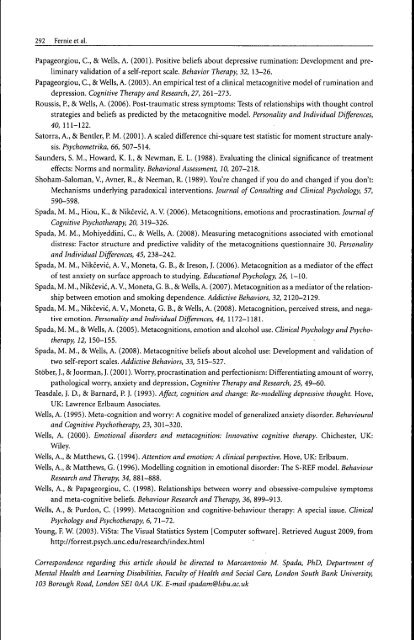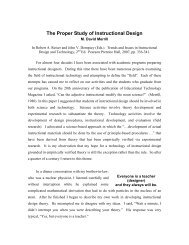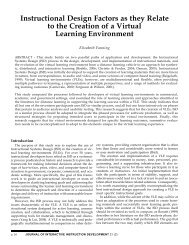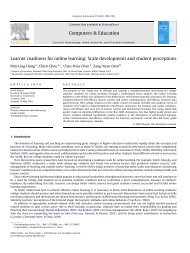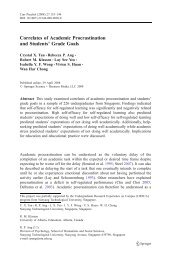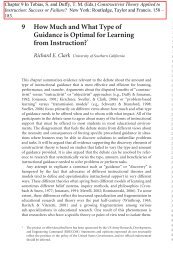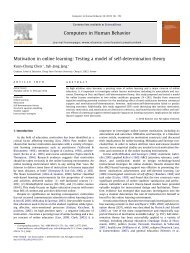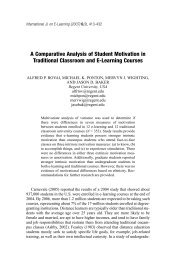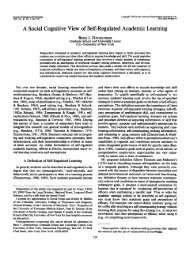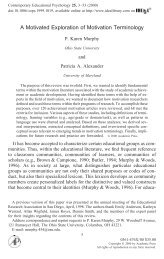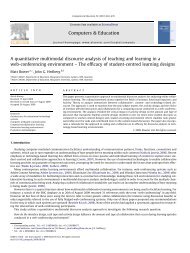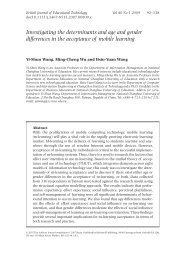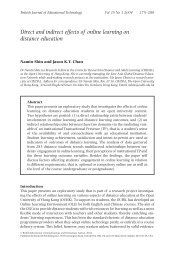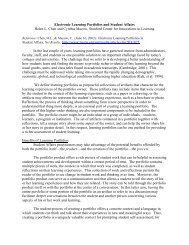Metacognitive Beliefs About Procrastination ... - Anitacrawley.net
Metacognitive Beliefs About Procrastination ... - Anitacrawley.net
Metacognitive Beliefs About Procrastination ... - Anitacrawley.net
Create successful ePaper yourself
Turn your PDF publications into a flip-book with our unique Google optimized e-Paper software.
292 Fernie et al.Papageorgiou, C, & Wells, A. (2001). Positive beliefs about depressive rumination: Development and preliminaryvalidation of a self-report scale. Behavior Therapy, 32, 13-26.Papageorgiou, C, & Wells, A. (2003). An empirical test of a clinical metacognitive model of rumination anddepression. Cognitive Therapy and Research, 27, 261-273.Roussis, P., & Wells, A. (2006). Post-traumatic stress symptoms: Tests of relationships with thought controlstrategies and beliefs as predicted by the metacognitive model. Personality and Individual Differences,40,111-122.Satorra, A., & Bentler, P. M. (2001). A scaled difference chi-square test statistic for moment structure analysis.Psychometrika, 66, 507-514.Saunders, S. M., Howard, K. I., & Newman, E. L (1988). Evaluating the clinical significance of treatmenteffects: Norms and normality. Behavioral Assessment, 10, 207-218.Shoham-Saloman, V., Avner, R., & Neeman, R. (1989). You're changed if you do and changed if you don't:Mechanisms underlying paradoxical interventions. Journal of Consulting and Clinical Psychology, 57,590-598.Spada, M. M., Hiou, K., & Nikcevic, A. V. (2006). Metacognitions, emotions and procrastination. Journal ofCognitive Psychotherapy, 20, 319-326.Spada, M. M., Mohiyeddini, C, & Wells, A. (2008). Measuring metacognitions associated with emotionaldistress: Factor structure and predictive validity of the metacognitions questionnaire 30. Personalityand Individual Differences, 45, 238-242.Spada, M. M., Nikcevic, A. V., Mo<strong>net</strong>a, G. B., & lreson, J. (2006). Metacognition as a mediator of the effectof test anxiety on surface approach to studying. Educational Psychology, 26, 1-10.Spada, M. M., Nikcevic, A. V., Mo<strong>net</strong>a, G. B., & Wells, A. (2007). Metacognition as a mediator of the relationshipbetween emotion and smoking dependence. Addictive Behaviors, 32, 2120-2129.Spada, M. M., Nikcevic, A. V., Mo<strong>net</strong>a, G. B., & Wells, A. (2008). Metacognition, perceived stress, and negativeemotion. Personality and Individual Differences, 44, 1172—1181.Spada, M. M., & Wells, A. (2005). Metacognitions, emotion and alcohol use. Clinical Psychology and Psychotherapy,12, 150-155.Spada, M. M., 8c Wells, A. (2008). <strong>Metacognitive</strong> beliefs about alcohol use: Development and validation oftwo self-report scales. Addictive Behaviors, 33, 515-527.Stöber, J., 8c Joorman, J. (2001). Worry, procrastination and perfectionism: Differentiating amount of worry,pathological worry, anxiety and depression. Cognitive Therapy and Research, 25, 49-60.Teasdale, J. D., 8c Barnard, P. J. (1993). Affect, cognition and change: Re-modelling depressive thought. Hove,UK: Lawrence Erlbaum Associates.Wells, A. (1995). Meta-cognition and worry: A cognitive model of generalized anxiety disorder. Behaviouraland Cognitive Psychotherapy, 23, 301-320.Wells, A. (2000). Emotional disorders and metacognition: Innovative cognitive therapy. Chichester, UK:Wiley.Wells, A., 8c Matthews, G. {1994). Attention and emotion: A clinical perspective. Hove, UK: Erlbaum.Wells, A., 8c Matthews, G. (1996). Modelling cognition in emotional disorder: The S-REE model. BehaviourResearch and Therapy, 34, 881-888.Wells, A., 8c Papageorgiou, C. (1998). Relationships between worry and obsessive-compulsive symptomsand meta-cognitive beliefs. Behaviour Research and Therapy, 36, 899-913.Wells, A., 8c Purdon, C. (1999). Metacognition and cognitive-behaviour therapy: A special issue. ClinicalPsychology and Psychotherapy, 6, 71-72.Young, F. W. (2003). ViSta: The Visual Statistics System [Computer software]. Retrieved August 2009, fromhttp://forrest.psych.unc.edu/research/index.htmlCorrespondence regarding this article should be directed to Marcantonio M. Spada, PhD, Department ofMental Health and Learning Disabilities, Faculty of Health and Social Care, London South Bank University,103 Borough Road, London SEI OAA UK. E-mail spadam@lsbu.ac.uk


